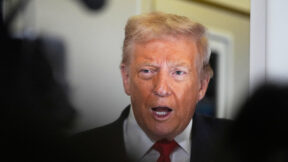The Media is Blinded By Its Destructive and Unshakable Belief in Donald Trump’s Invincibility

AP Photos
There are a few missing characters in McKay Coppins’ latest for the The Atlantic, in which he submits that the bulk of the Republican establishment agrees that Donald Trump is the biggest impediment to the party’s success, but is unwilling to do anything to sideline him as he hurtles toward a third straight nomination by the party.
“Virtually everyone in the party agrees: It’s time to move on from Trump,” writes Coppins. “But ask them how they plan to do that, and the discussion quickly veers into the realm of hopeful hypotheticals.”
Some hope Trump will just die, some pine for donors to freeze him out, and others hope that his legal troubles will disqualify him, Coppins reports. Trump’s GOP competition, meanwhile, merits just one dismissive mention:
For all of Trump’s supposedly diminished political clout, he remains a strong favorite in primary polls, where he leads his nearest rival by about 15 points. And few of the other top figures in the party—Ron DeSantis, Mike Pompeo, Nikki Haley—have demonstrated an ability to take on Trump directly and look stronger for it.
It’s an unconvincing description of the state of play. How would DeSantis, Pompeo, and Haley — none of whom have ever run against Trump — have already demonstrated an ability to rake him on directly? Who is the mysterious — purportedly unthreatening — rival to whom he alludes?
What’s more, national and state-level polling compiled by FiveThirtyEight tells a complex story about what appears to be a two-man race for the Republican nomination. On the national scale, Trump and DeSantis appear to trade leads in head-to-head matchups, with DeSantis ahead by 5 and 16 in two recent surveys and Trump ahead by 11 in another. The former president does boast leads in most, but not all polling of crowded primary fields including Pompeo, Haley, and others.
On the state level, things are bleaker still for Trump. DeSantis is competitive or ahead in the early primary states and holds solid leads over Trump in their home state of Florida as well as neighboring Georgia; that’s all before DeSantis has even declared his candidacy.
The evidence presented in support of donor enthusiasm for a Trump redux is similarly thin. In support of the claim that the donor class still may back Trump in a primary, Coppins cites a single anecdote relayed by an anonymous “Republican consultant.” That consultant told Coppins that a few major donors in attendance at a single 2021 dinner were not fully committed to stopping Trump “from returning to the Oval Office.” But that that doesn’t preclude them from supporting other candidates in the primary, and the vast majority of reporting around the 2024 race indicates that Trump’s donor base is waning as DeSantis’s waxes.
Ken Griffin, who gave more than $100 million to Republican candidates during the 2022 cycle, has already said he would back DeSantis over Trump in a GOP primary. So has Stephen Schwarzman, who made a $3 million contribution to Trump’s Super PAC in 2020 and spent more than $35 million on electing Republicans in 2022. Robert and Rebekah Mercer, two key Trump allies during his 2016 bid, have also indicated that they would not back Trump in a primary contest.
As of last September, DeSantis had raised more than any other prospective presidential candidate, including Trump, according to OpenSecrets. All told, the Florida governor raised an astounding $200 million during his 2022 reelection bid.
There’s been a clear shift within conservative media, where many are making arguments both implicitly and explicitly in favor DeSantis over Trump. Responding to Trump’s official entrance into the 2024 race, National Review‘s editorial board argued that the collected answer of conservatives “should be a firm, unmistakable, No.” Rupert Murdoch’s media empire, including Fox News, the Wall Street Journal, and the New York Post, have all shown signs of skepticism, if not outright opposition, regarding Trump v.3. Even Bill Mitchell, a longtime Trump loyalist and online influencer, has endorsed DeSantis.
The case Coppins makes is thin and seems geared more toward condemning a cowardly, doomed strategy of Republican elites than providing readers with a clear-eyed evaluation of the 2024 race.
The argument fails prescriptively as well as descriptively. No realistic vision of how Trump’s hostile takeover of the GOP ends will be defined by Republicans of all types and vocations rising with a single voice to utter a firm, unmistakable no. Such an approach was already tested in 2016.
Nearly every realistic one, on the other hand, will begin with a single challenger convincing more GOP voters to trust him than Trump. For the first time in a long time, a candidate with the potential to do so has emerged, and donors and pundits have largely coalesced around him.
The same media infrastructure that reviles Trump is plagued by a blind, destructive, and unshakable belief in his political invincibility. At times, it even seems invested in it. In November, Coppins’s colleague Mark Leibovich published a shoddy hit piece on DeSantis in an effort to downplay his chances against Trump.
While the press scoffs at the supposedly bare bones effort of anti-Trump Republicans to supplant the former president, their own misplaced and ironclad faith in him has turned them into unwitting abettors of his cause.
This is an opinion piece. The views expressed in this article are those of just the author.




